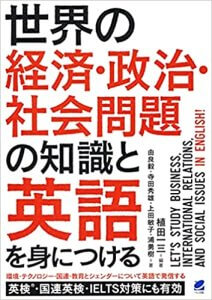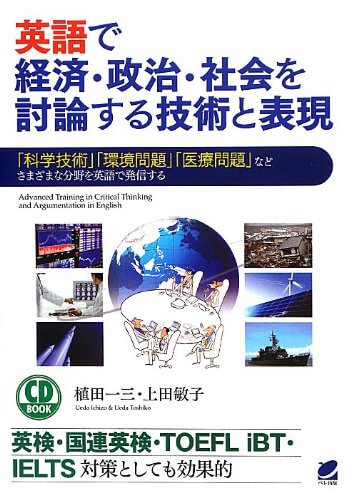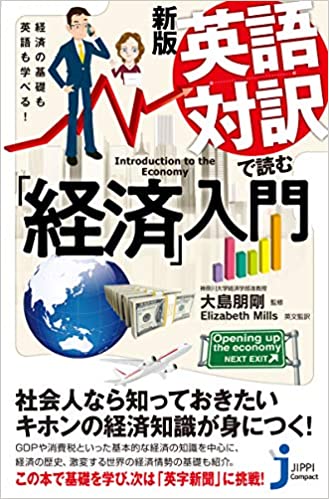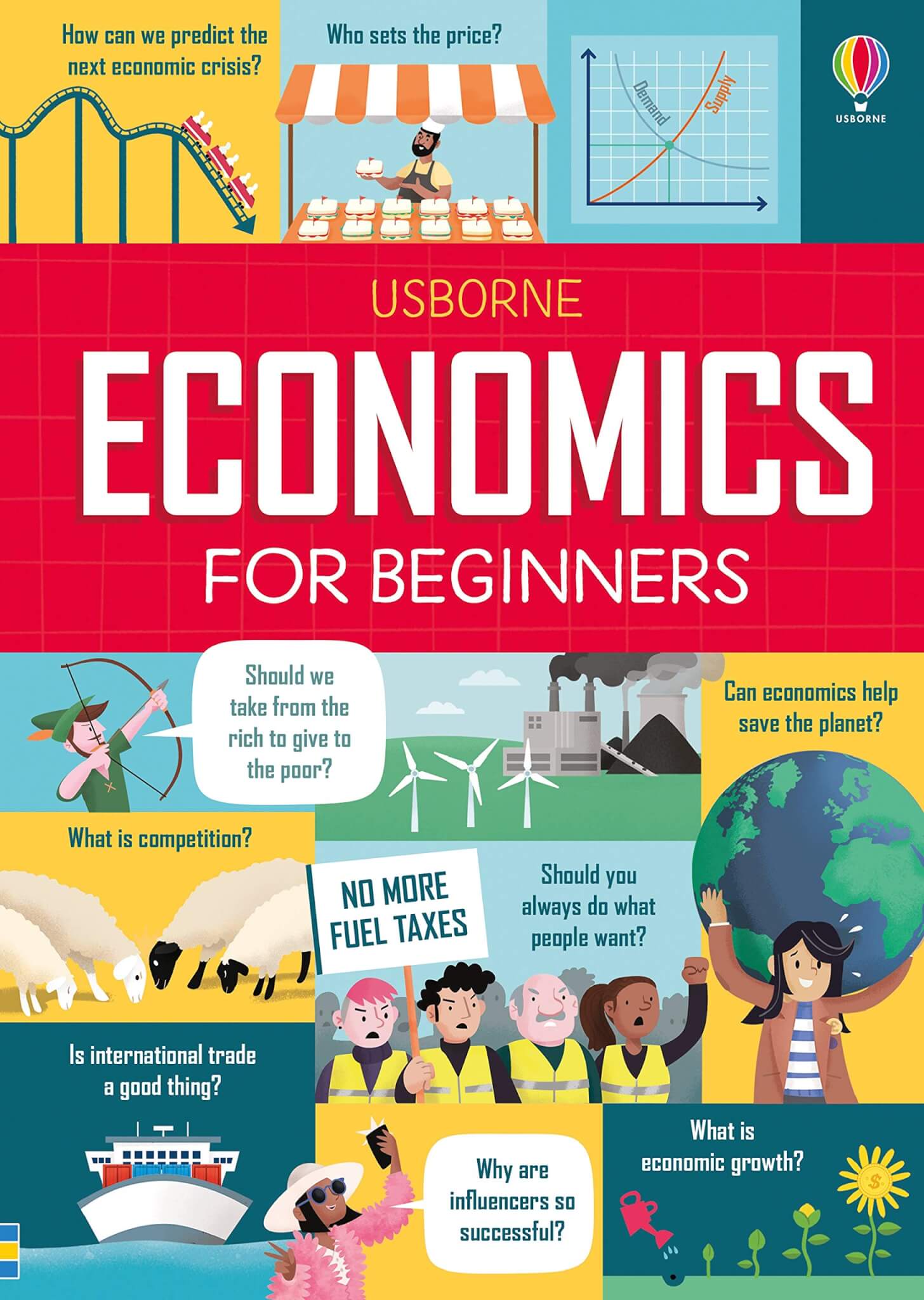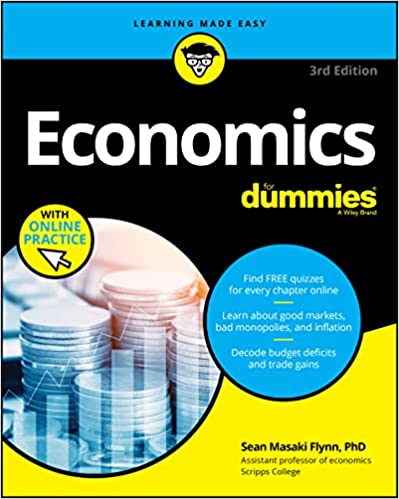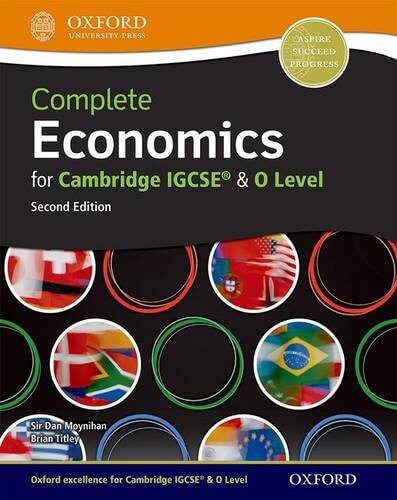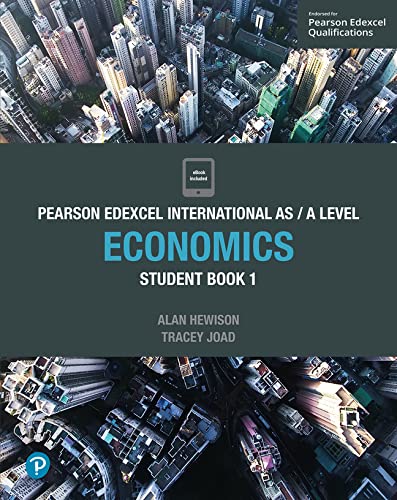目次
英語で経済学を理解し、話す方法。このブログでは、よく使われる経済学の単語、例文、おすすめの経済学単語集(英語・日本語)、英語のリスニング力を上げるために見るべきおすすめのビデオなどを紹介しています。もしあなたがビジネスの分野で働いていて、仕事で英語が必要、または使うのであれば、このブログは必読でしょう。
How to understand and talk about economics in English: This blog guides you through the most commonly used economics vocabulary, example sentences, recommendations for economics vocabulary books in both English and Japanese, and recommendations for videos to watch to improve your listening skills in English too. If you work in any area of business, and you need or use English at work, this blog is going to be essential reading.
英語で経済学:単語と例文
1. Financial markets:金融市場
金融市場とはお金の取引をする場所のことです。
取引の期間や種類によって、いくつかの市場に分かれています。
A financial market is a place where money is traded.
They are divided into several markets, depending on the duration and type of transaction.
2. Gross Domestic Product (GDP):国内総生産
国内総生産とは世界各国で発表される最も代表的な経済指標の一つで、GDP(Gross Domestic Productの略)の略称で広く知られています。国内総生産は国内で一定期間内に生産された財やサービスなどの付加価値の合計を示す指標です
Gross Domestic Product is one of the most representative economic indicators published in countries around the world and is widely known by the abbreviation GDP (short for Gross Domestic Product). Gross domestic product is an indicator of the total value added of goods and services produced in a country within a given period of time
3. Gross National Product (GNP):国内総生産
国民総生産 (Wikipedia)(こくみんそうせいさん、英:Gross National Product、略称:GNP)とは、ある一定期間にある国民によって新しく生産された財(商品)やサービスの付加価値の総計である。かつては国の経済規模を比較するため新聞や教科書などで頻繁に利用されたが、日本では1993年から代表的指標として国内総生産 (GDP) が使われるようになり、かつてほど注目されなくなった。さらに2000年には国民経済計算の体系変更により国民総生産という概念自体が消滅した。ただ新体系にはほぼ同一の概念として国民総所得 (GNI) がある。
Gross National Product (GNP) is the total added value of goods and services newly produced by a nation’s citizens during a given period. In the past, GNP was frequently used in newspapers and textbooks to compare the scale of a country’s economy, but since 1993, the Gross Domestic Product (GDP) has been used as a representative indicator in Japan, and it has not attracted as much attention as it once did. In 2000, the concept of gross national product itself disappeared due to a change in the system of national accounts. However, the new system includes a nearly identical concept, gross national income (GNI).
4. Interest rates:金利
利子率、利率、利回り、割引率なども金利である。金利も他の商品サービスと同様に、金融市場における資金の借り手と貸し手の関係、すなわち需要と供給によって決まる。したがって金利は資金を借りる(貸す)ときの費用といえる。
Interest rate, rate of interest, yield, and discount rate are also interest rates. Like other commodity services, interest rates are determined by the relationship between borrowers and lenders of funds in financial markets, i.e., supply and demand. Therefore, interest rates are the cost of borrowing (lending) funds.
5. Inflation:インフレ率
日本のインフレ率は消費増税時を除けば約30年振りに前年比2%に到達したが、9%前後の欧米諸国と比べると物価上昇は限定的。企業の価格支配力の違い、経済回復ペースの違い、人手不足の度合いの違いを反映。
Japan’s inflation rate reached 2% y/y for the first time in around 30 years, except at the time of the consumption tax increase. However, price increases are limited compared to some Western countries, where inflation is around 9%. This reflects differences in corporate price dominance, the pace of economic recovery, and the degree of labour shortages.
6. Economic Growth:経済成長
IMFのベースライン予測では、世界経済成長率は昨年の6.1%から減速して今年は3.2%、来年は2.9%となる見込みであり、それぞれ4月の予測値から0.4%ポイント、0.7%ポイントの引き下げとなった。これには米国、中国、ユーロ圏という3大経済国・地域の失速が反映されており、世界経済見通しはその影響を強く受けた。
The IMF’s baseline forecasts call for global economic growth to slow from 6.1% last year to 3.2% this year and 2.9% next year, down 0.4 and 0.7 percentage points, respectively, from the April forecast. This reflects the stalling of the three largest economies-the U.S., China, and the eurozone-and the global economic outlook has been strongly affected by this.
7. Security:証券
経済学では、「証券」とは、経済的価値を持ち、購入、売却、取引が可能な金融資産または金融商品を指します。
In economics, a “security” is a financial asset or instrument that has economic value and can be bought, sold, or traded.
8. Bear Market:ベアマーケット
ベアマーケットとは、市場において下落が続いていることを指し、弱気相場や下げ相場と呼ぶ場合もあります。
A bear market refers to a continuing decline in the market and is sometimes called a bear market or a down market.
9. Bull Market:ブルマーケット
ブルマーケット、またはブルラン(強気相場)は、投資家の大多数が買っており、需要が供給を上回り、市場の信頼が高く、価格が上昇している期間として定義されています。特定の市場で、価格が急速に上昇傾向にある場合、投資家の大多数が価格のさらなる上昇について楽観的または「強気」になっていることを示す可能性があります。
A bull market, or bull run, is defined as a period when the majority of investors are buying, demand exceeds supply, market confidence is high, and prices are rising. A rapid upward trend in prices in a particular market may indicate that the majority of investors are optimistic or “bullish” about further price increases.
10. Business Cycle:ビジネスサイクル
ビジネスサイクルとは景気変動の様態のひとつのことを言い、シクリカルな景気変動のことです。景気の回復や拡大、後退や悪化が繰り返し現れることもビジネスサイクルのひとつです。国民経済計算によると、GDPが一国経済変動を一番よく表すものと考えられています。
A business cycle is a cyclical of business fluctuation. Repeated economic recoveries, expansions, recessions, and downturns are part of the business cycle. According to national accounts, GDP is the best indicator of a country’s business cycle fluctuations.
11. Fiscal Policy:財政政策
政府が歳入や歳出を通じて経済に影響を及ぼす政策のこと。中央銀行が行う金融政策とならぶ経済政策の柱です。歳入面では増税(または減税)や国債発行の増減、歳出面では公共事業の拡大(または縮小)をすることによって、景気の拡大や抑制を図る政策です。
A government policy that affects the economy through revenues and expenditures. Along with monetary policy conducted by the central bank, it is a pillar of economic policy. The government aims to expand or control the economy by raising (or lowering) taxes and increasing (or decreasing) government bond issuance on the revenue side, and by expanding (or reducing) public works projects on the expenditure side.
12. Law of Supply and Demand:需要と供給の法則
商品の市場価格と売買量は競争市場における需要と供給によって決まるということ。一般に,供給側の事情を一定にして,需要量が増加(減少)すると,価格が上昇(低落)し,また需要側の事情を一定にして,供給量が増加(減少)すると,価格が低落(上昇)し,売買量が増加(減少)する。需給の一致するところで決まる価格を均衡価格という。
The market price and trading volume of a commodity are determined by supply and demand in a competitive market. In general, when the quantity demanded increases (decreases) while the supply side conditions remain constant, the price rises (falls); and when the quantity supplied increases (decreases) while the demand side conditions remain constant, the price falls (rises) and the quantity traded increases (decreases). The price determined at the point where supply and demand coincide is called the equilibrium price.
13. Macroeconomics:マクロ経済
マクロとは「巨大な」という意味があり、マクロ経済とは、政府、企業、家計を一括りにした、経済社会全体の動きのことです。
イメージでいうと、空の上から森全体を見るといった感じでしょう。国や政府のレベルで物価や消費、金融などの動きを国全体から考えるというものです。
日常では、景気が悪いとか、円高だとか、失業率が上がったなどというニュースが問題になりますが、これらがマクロ経済の要素のひとつで、大きな視点で世の中の動きを見ることで日本のこれからを考えることができます。
Macro means “very large,” and the macroeconomy is the movement of the economy and society as a whole, including government, businesses, and households.
In image, it is like looking at the whole forest from the sky. The idea is to consider the movement of prices, consumption, finance, etc. at the national or government level from the perspective of the country as a whole.
In everyday life, news about the bad economy, the strong yen, rising unemployment, and so on, are problems, but these are some of the elements of macroeconomics, and by looking at the world’s movements from a larger perspective, we can think about the future of Japan.
14. Microeconomics:ミクロ経済
家計(個人)や企業を最小単位としてその行動や意思決定がどのようになされるかを扱う経済学の領域のことです。狭い視点(ミクロ的な視点)から経済分析をすることから、ミクロ経済(学)と呼ばれています。
Microeconomics is a field of economics that deals with households (individuals) and firms as the smallest units and how their actions and decisions are made. It is called microeconomics because economic analysis is conducted from a narrow (micro) perspective.
15. Monetarism:マネタリズム
マネタリズム(monetarism)とは、経済現象における「貨幣(マネー)」の役割を重視し、貨幣の量によってその他の経済上の変数も変化すると考える、経済学上の考え方のことです。
簡単に言えば、貨幣の量を増減させることで物価や失業率にも変化を与えることができる、と考える経済学の立場のことです。
現代の日本でも、景気刺激のために、中央銀行(日銀)によって大量のお金が市中に投入される「量的緩和政策」が行われています。
Monetarism is an economic concept that emphasizes the role of money in economic phenomena and believes that other economic variables change with the quantity of money.
Simply put, it is a position in economics that believes that prices and unemployment rates can be changed by increasing or decreasing the quantity of money.
In modern Japan, the central bank (Bank of Japan) has been implementing a policy of “quantitative easing,” in which large amounts of money are injected into the market to stimulate the economy.
16. Keynesian Economic Policy:ケインズの経済政策
ケインズの経済政策理論に基づき、景気停滞期に国の財政支出を増加させて経済活動の活発化をはかる考え方。
Based on Keynesian economic policy theory, the idea of stimulating economic activity by increasing government fiscal spending during economic stagnation.
17. Free Market:自由市場
自由市場(じゆうしじょう、英: free market)はすべての取引が政府や権力による強制で行われるのではなく、望むものが自発的に取引を行う市場を意味する。経済学の概念としては、計画経済の対極に位置する。
A free market is a market in which all transactions are not forced by government or authority, but rather are voluntary and carried out by those who wish to trade. As an economic concept, it is the opposite of a planned economy.
18. Opportunity Cost:機会費用
経済学では、そして人生の金銭的な決断のほとんどで、機会費用は見落とされたり、ごまかされたりすることがあります。
In economics, and in most of life’s financial decisions, opportunity costs can be overlooked or fudged!
19. Equity:資本
金融の世界では、資本は資産や企業の所有権「シェア」を表します。つまり、ある会社とその全資産を売却した場合、株主に還元される金額を表している。
In finance, equity represents the ownership “share” of an asset or company. That is, if a company and all its assets were sold, equity represents the amount of money that would be returned to a company’s shareholders.
20. Commodity:コモディティ
投資用語で、「コモディティ投資」という言葉があります。商品取引所で取引される商品は商品先物取引を意味し、主に原油や天然ガスなどの資源エネルギー、トウモロコシや大豆などの農産物類、金やプラチナなどの貴金属類を指すのです。
The term “commodity investment” is an investment term. Commodities traded on commodity exchanges means commodity futures trading, which mainly refers to resource energy such as crude oil and natural gas, agricultural commodities such as corn and soybeans, and precious metals such as gold and platinum.
ビジネス英語の語彙力を上げる! おすすめの参考書
経済学に関するおすすめの英語参考書 – English books about Economics
この2冊は、基本的な経済学を理解していれば難しくないし、多くの経済用語を英語で復習するのに最適な本なので、参考になります。通勤の電車の中で数日勉強するにはもってこいの本だと思います。
These two book are helpful because it is not difficult if you understand basic economics, and is an excellent way to review many economic terms in English. It would be a great book to study on the train for a few days on your way to work.
本書はやや難易度が高いが、金融や経済がより主要な仕事である場合、あるいは将来この分野で働くつもりで、経済学のための英語をしっかり身につけたい場合には、次のステップとして最適な一冊である。
This book is somewhat more challenging, but an excellent next step if finance and economics is more a major part of your job, or if you intend to work in the area in the future and you want to make sure your English for economics is strong.
最後に、この本はイギリスの大学入試で経済学を受験する学生が使っている本です 英語で経済学の知識を概ねお持ちの方、あるいは上記でおすすめした本をやりこんでいる方は、この本で上級レベルの経済学の英語知識を身につけることができます。英語の先生に、これを一緒に勉強できないか聞いてみることをお勧めします。この本を読んだことで、Economicsを簡単に理解し、英語で難なく議論できるようになります。
Finally, this book is used by students in the UK taking the university entrance exams for Economics! If you have a generally good knowledge of economics in English, or if you have worked through the books I have recommended above, this book will give you an excellent advanced level English knowledge of Economics. I would recommend you ask your English teacher if you can study this together. Having read this book, you will be able to understand and discuss Economics with ease, and without any difficulty in English.
英語で経済学:経済英語のリスニング練習に最適なYouTube動画
Here are some great YouTube videos to practice your listening for Economics English!
語彙の勉強をしながら、上記のお勧めの本を読みながら、リスニング力を試すのに最適です。
This is a great way to test your listening skills while you are studying the vocabulary and reading one of the books recommended above.
経済英語の練習に最適なYouTube動画をご紹介します。
最初は75%の再生速度で見て、聞こえた単語やフレーズを書き留めるためにノートを必ず持ってください。
Here are some great YouTube videos for practicing your Economics English
You can watch the video on 75% playback speed at first, and make sure to keep a notebook with you to write down any words or phrases you hear.
このビデオは、経済学の少し複雑な概念について、早口で話しているので、いいビデオだと思います。上級レベルの英語学習者が、より挑戦的なことを聞きたいと思ったときに最適です。また、経済学の話に混じって、普通の英語をたくさん使っているので、国際的な同僚とするような実際のディスカッションのように感じられるのも良い点です。
This is a nice video because it is a fast speaker talking about some slightly complex concepts in Economics. It’s great for more advanced level English students, who want to have more challenging things to listen to. It is also good because the speaker uses a lot of regular English, mixed in with her discussion on Economics, so you can feel like it is a real life discussion, as you would have with international colleagues.



